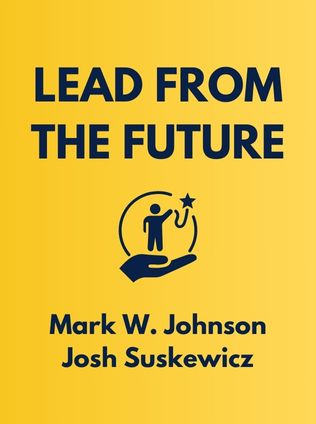
Lead from the Future
How to Turn Visionary Thinking Into Breakthrough Growth
By Mark W. Johnson and Josh Suskewicz
Published 04/2020
About the Author
Mark W. Johnson and Josh Suskewicz, the authors of "Lead from the Future," are influential figures in the field of business strategy and innovation. Mark W. Johnson is a co-founder and senior partner at Innosight, a globally recognized consulting firm specializing in innovation and strategy. Johnson has authored several seminal works, including "Dual Transformation" and "Reinvent Your Business Model," which focus on helping organizations navigate complex market changes and drive sustained growth. His expertise lies in developing growth strategies and managing innovation, making him a key voice in the conversation about future-proofing businesses.
Josh Suskewicz, also a partner at Innosight, brings a deep understanding of how businesses can adapt and thrive in an increasingly uncertain world. With extensive experience in helping companies implement transformative strategies, Suskewicz has worked closely with leaders to foster innovation and drive change. Together, Johnson and Suskewicz offer a powerful combination of theoretical knowledge and practical insights, making "Lead from the Future" a crucial guide for leaders looking to steer their organizations toward long-term success.
Main Idea
"Lead from the Future" introduces the concept of "visionary planning," a strategic approach that shifts the focus from the present to the future. Johnson and Suskewicz argue that traditional business strategies, which often emphasize short-term gains and incremental improvements, are insufficient in today's rapidly changing world. Instead, leaders must adopt a "future-back" mindset, where they envision a compelling future for their organization and then work backward to determine the steps needed to achieve that vision.
The essence of visionary planning lies in its proactive approach to change. Rather than reacting to external pressures as they arise, visionary leaders anticipate market shifts, technological advancements, and evolving customer needs. By doing so, they position their organizations to not only survive but thrive in the future. This book offers a comprehensive framework for implementing visionary planning, from creating a bold vision to executing a strategy that brings that vision to life.
Table of Contents
- Why Use Visionary Planning
- The Foundation of Visionary Planning
- The Three Stages of Visionary Planning
- Realizing Your Visionary Plan
- Embedding Visionary Planning in Your Organization
Why Use Visionary Planning
In the face of rapid technological advancements, shifting market dynamics, and evolving customer expectations, traditional business strategies often fail to secure long-term success. Leaders who focus primarily on short-term objectives—such as quarterly profits or immediate operational efficiencies—may find their organizations unprepared for future disruptions. This reactive approach, which Johnson and Suskewicz refer to as "current-state thinking," limits an organization's ability to adapt and innovate.
Visionary planning offers an alternative by encouraging leaders to look beyond the immediate horizon and consider the long-term implications of their decisions. As the authors state, “No one can predict the future. But you can improve your organization's longevity, relevance, and growth in the long term by changing your focus from short-term concerns to the future you want to see five to ten years out” (Johnson & Suskewicz). By adopting a future-back approach, leaders can develop strategies that not only address current challenges but also position their organizations to capitalize on future opportunities.
Advantages of Visionary Planning
- Anticipating Disruptions: Visionary planning allows organizations to identify potential disruptions before they occur, enabling them to develop strategies that mitigate risks and exploit emerging opportunities.
- Driving Innovation: By focusing on the future, visionary planning encourages breakthrough innovations that create new markets and redefine industries, rather than merely improving existing products or services.
- Ensuring Long-Term Growth: Visionary planning aligns an organization's current actions with its long-term goals, ensuring that short-term decisions contribute to sustained growth and relevance.
- Building Organizational Resilience: Organizations that embrace visionary planning are better equipped to navigate uncertainty and adapt to changing circumstances, making them more resilient in the face of challenges.
By focusing on these advantages, visionary planning offers a strategic framework that goes beyond the limitations of conventional approaches. It enables leaders to envision a future where their organization not only survives but thrives, even in the face of uncertainty and disruption.
The Foundation of Visionary Planning
The foundation of visionary planning is built on two core concepts: breakthrough innovation and the discovery cycle. These concepts provide the necessary tools for leaders to develop and execute strategies that are aligned with a long-term vision.
Breakthrough Innovation
Breakthrough innovation is at the heart of visionary planning. Unlike incremental improvements, which enhance existing products or services, breakthrough innovations create entirely new markets or redefine existing ones. Johnson and Suskewicz emphasize that “Even if your company is doing well currently, its growth will likely stagnate without effective breakthrough innovation strategies” (Johnson & Suskewicz). This highlights the importance of looking beyond immediate business needs and focusing on innovations that can drive long-term growth.
However, many organizations struggle with breakthrough innovation because they perceive it as risky and resource-intensive. Leaders often prioritize projects that improve efficiency or enhance current offerings, believing that these are safer bets. Yet, as the authors argue, “The cost of not taking innovation risks is much higher than sticking to safer incremental innovations” (Johnson & Suskewicz). Visionary planning encourages leaders to embrace the risks associated with breakthrough innovation, as these risks are essential for achieving long-term success.
Sign up for FREE and get access to 1,400+ books summaries.
You May Also Like
The Subtle Art of Not Giving a F*ck
A Counterintuitive Approach to Living a Good Life
By Mark MansonRich Dad Poor Dad
What the Rich Teach Their Kids About Money - That the Poor and Middle Class Do Not!
By Robert T. KiyosakiHow To Win Friends and Influence People
The All-Time Classic Manual Of People Skills
By Dale CarnegieQuiet: The Power of Introverts
The Power of Introverts in a World That Can't Stop Talking
By Susan Cain



















